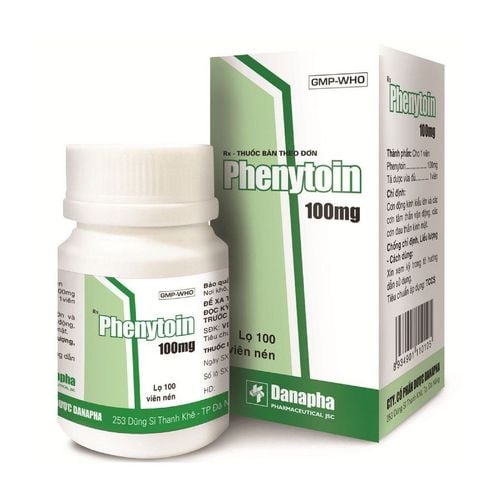This is an automatically translated article.
Keppra is an antiepileptic drug, commonly used in the treatment of seizures with partial onset or with or without generalized seizures in newly diagnosed patients. So how should Keppra be taken?1. Effects of Keppra
What is Keppra? Keppra, also known as levetiracetam, belongs to the class of antiepileptic drugs. Keppra is used in the treatment of medical conditions such as partial onset seizures with or without secondary generalization in adolescents aged 16 years or newly diagnosed adults. . In addition, Keppra 500mg is also used in combination treatment in:
Partial onset seizures in children 4 years of age and older and adults with epilepsy Muscle convulsions in adults and adolescents from 4 years of age and older. 12 years of age with juvenile myoclonic seizures Primary generalized tonic-clonic seizures in children 12 years of age and older with idiopathic generalized epilepsy and adults In addition, some other side effects not listed on the label medication but has been approved and your doctor may prescribe Keppra. Therefore, before taking the medicine, consult your doctor.
2. How to use Keppra
Keppra is available in the form of film-coated tablets and oral solution. The tablet form is not suitable for use in children under 6 years of age and is not suitable for initial treatment in children weighing less than 25kg, patients who cannot swallow tablets or take doses less than 250mg. In these cases, Keppra oral solution should be used. Measure the amount of the drug solution carefully with the syringe, do not use a spoon or spoon to measure the medicine. Dosage will be based on the condition and age of the patient.
Patients can take the drug with or without food, before or after eating. However, to reduce stomach irritation you can take it with food and need to swallow the tablet whole with a full glass of water, do not chew or break the tablet.
To use the drug safely, take Keppra exactly as directed by your doctor, do not use more than the recommended dose, smaller or longer than prescribed. Use Keppra regularly to get the most benefit and you can stop taking it if any new symptoms appear or the condition does not improve after 7 days. Patients absolutely do not abuse the drug for too long for a long time. This does not make the patient's condition better, but also increases the risk of unwanted effects.
3. Undesirable effects when using Keppra
Keppra can cause some unwanted and common side effects that can be mentioned as:
Nasopharyngitis Headache Drowsiness Anorexia Depression Opposition or aggression anxiety Insomnia Irritation Convulsions Disorder balance Dizziness Lightheadedness Lethargy Dizziness Cough Abdominal pain Diarrhea Indigestion Nausea Rash Asthenia Fatigue Some rare side effects include weight gain, suicidal thoughts, mental confusion, hallucinations, abnormal behavior, anger, state of anxiety, panic, sensory instability, mood swings, forgetfulness, anxiety, memory loss, abnormal movement, paresthesia, diplopia, confusion attention disorder, hair loss, blurred vision, eczema, itching, muscle weakness, injury, muscle pain, abnormal liver function tests
Before prescribing a drug, a doctor always considers the benefits and effectiveness of Keppra. bring. While taking Keppra can still occur unwanted effects. Therefore, when unusual symptoms are present, especially when a severe allergic reaction occurs with accompanying signs such as severe dizziness, difficulty breathing, rash, anxiety, cognitive impairment , respiratory failure and coma, the patient should immediately notify the doctor or nurse for immediate medical intervention.
4. Some notes when using Keppra
Some cautions when using Keppra include:
Allergy notice to keppra hypersensitivity reaction to any other allergy. Keppra may contain ingredients that don't work and cause an allergic reaction or other serious problems. Report any medications you are taking including prescription and nonprescription drugs, herbs and supplements, foods, dyes or preservatives. Keppra is contraindicated in patients who are allergic to levetiracetam or other pyrrolidone derivatives such as piracetam,... Do not use alcohol during treatment with Keppra Before stopping the drug, reduce the dose gradually Need to closely monitor behaviors such as suicidal thoughts in patients being treated for epilepsy Some patients taking Keppra can There may be a feeling of drowsiness or other symptoms related to the central nervous system, so caution should be exercised when using drugs that require alertness such as driving, operating machinery For patients with renal impairment: Approximately 95% of the drug is excreted in the urine, so the daily dose of the drug should be adjusted based on creatinine clearance in patients with moderate to severe renal impairment Patients with mild hepatic impairment do not need to be adjusted. Dosage adjustment and possible dose reduction based on assessment of renal function For children dosage should be calculated based on weight and age. There are currently no adequate data on the treatment of Keppra in children under 4 years of age. Keppra should not be used during pregnancy or in women who wish to have children in the near future. Because stopping antiepileptic medication can lead to an exacerbation of the disease that affects both mother and baby. Keppra should also not be used by women who are breast-feeding. Because it may be excreted in human milk, the benefits and risks should be weighed before taking. If you forget to take a dose of Keppra, take it again as soon as possible. However, if it is close to the time of your next dose, skip the missed dose and continue taking or injecting the medicine as scheduled. Do not use more drug than prescribed treatment. Taking an overdose of Keppra or swallowing it can cause serious symptoms such as nausea, vomiting, abdominal pain, shortness of breath, fainting,...
5. Keppra . drug interactions
Drug interactions can decrease the effectiveness of Keppra, or increase the effect of unwanted effects. Tell your doctor about all other medicines you are taking including over-the-counter medicines, vitamins, prescription drugs, and herbal products. Do not start, stop or change the dose of any medicine without your doctor's consent.
Some drugs that can interact with keppra include:
Beta blockers, H2-histamine blockers, Fentanyl, antiepileptic drugs, Theophylline, Quinidi, Digoxin, Alpha blockers, other calcium blockers...
6. How to store Keppra
Store Keppra with film-coated tablets at room temperature below 30 degrees Celsius, protected from light and away from moisture. For oral solution dosage forms usually have a shelf life of 3 years when kept in the same cap, but once opened, the shelf life is 7 months. After taking a sufficient amount of medicine to drink, it is necessary to close the bottle carefully and store it in cool conditions and in direct sunlight. Do not store in damp places or in the freezer and keep away from heat and open flames. Different medicines will have different storage methods, so read the storage instructions on the package carefully, or ask your pharmacist.
Keep Keppra out of reach of children and household pets. When the medicine has expired or is damaged and cannot be used anymore, dispose of it and dispose of it properly. Do not arbitrarily dispose of Keppra into an environment such as a water pipe or toilet unless requested to do so.
In summary, Keppra is used in the treatment of medical conditions such as partial onset seizures with or without secondary generalization in adolescents from 16 years of age or new adults. diagnosed. However, Keppra can cause some unwanted effects and drug interactions, so tell your doctor what medicines you are taking to reduce the risk of unwanted effects and at the same time increase your chances of getting worse. effective for treatment.
Please dial HOTLINE for more information or register for an appointment HERE. Download MyVinmec app to make appointments faster and to manage your bookings easily.













